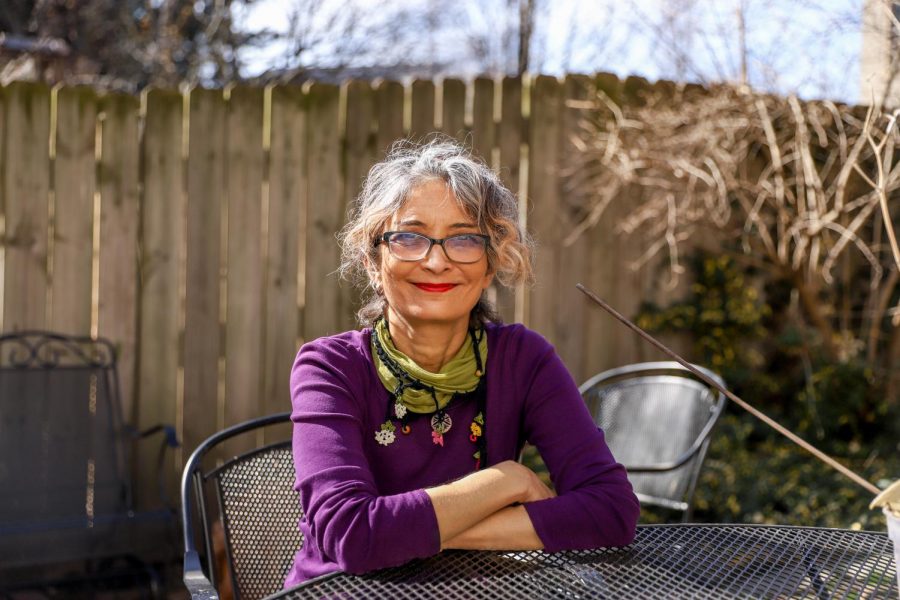Pitt’s first formal Scholar at Risk reflects on year at Pitt
Kaycee Orwig | Senior Staff Photographer
Hatice Simten Coşar is Pitt’s Global Studies Center first Scholar at Risk. Coşar, who left Turkey in 2018, teaches a course called Scholars at Risk, which explores academic freedom and has students raise awareness for a specific scholar at risk.
March 25, 2021
Feminist scholar and professor Hatice Simten Coşar was among more than 1,000 academics who signed a statement in 2016 against military actions taken by the Turkish government. Immediately, signers of the statement faced arrest and detention.
“As academics, we took it as our responsibility to come up with a voice asking the state to stop that violence,” Coşar said.
The Turkish state university at which Coşar taught presented her with a prewritten statement that would, with her signature, acknowledge her previous signature on the anti-military statement as a mistake. Coşar refused to sign and said she began feeling unsafe.
“I was warned that I might lose my job and also my retirement rights, which was true, because most of my colleagues who were signers lost that,” Coşar said. “It became so repressive in the country that I could not find the space to write.”
Coşar enrolled in the Scholars at Risk program and left Turkey in 2018. Scholars at Risk is an international program that works to promote academic freedom and protect scholars who are threatened in their home countries. Coşar became a visiting professor at Carleton University in Ottawa, Canada, and then taught at Cornell. In January 2020, Pitt’s Global Studies Center welcomed her as its first formal Scholar at Risk.
Coşar is currently staying with City of Asylum, a sanctuary to endangered literary writers, on Pittsburgh’s North Side. City of Asylum partnered with Pitt to provide her housing.
Coşar said leaving Turkey not only altered her life, but also her research. Prior to her departure, she was conducting research on feminist academics and their encounters with the increasing neoliberalization in academia and the corporatization of knowledge in higher education in Turkey. After her arrival, Coşar modified her research to include North America. She said she sees the expansion as an opportunity to identify connections between the two continents.
“I was thinking about two cases talking to each other, the United States case and the Turkish case talking to each other, a first world and a third world [country],” Coşar said.
Coşar said although she had considered herself a feminist for most of her life, she wasn’t involved in organized feminism until her 30s, after conducting field research involving Turkish feminist organizations whose leaders “pulled [her] onto the ground” toward grassroots activism. Her encounters with members in these organizations shaped her understanding of feminist activism.
“I have been feminist but as an academic, I had been active in academic life, on an individual basis, acting with other feminist academics, but I was not on the grassroots,” Coşar said. “The Kurdish feminists taught me, more than any other person, how to be politically active, how to be patient, how to cooperate despite radical differences, how to not accept a victimhood identity but to empower yourself through activism.”
Coşar said she resolutely calls herself a feminist in spite of the negative connotation feminism carries in Turkey. She said she believes using the term as a part of one’s identity strengthens that person’s desire for gender equality.
“In Turkey, feminism has always had a bad name, you are viewed as immoral, or amoral, with just the label that is feminist, that’s why I am stubborn in underlining that I am a feminist. [Identifying with the term feminist] makes you evermore want gender equality, first and foremost, and equality among gender identities,” Coşar said.
Coşar has continued her feminist work while in Pittsburgh. Alongside a couple of her colleagues, she began working with the Pitt library staff toward publishing an online feminist journal named Feminist Asylum. Currently, the journal is in the application process.
“It is going to be evaluated, it is going to be perhaps rejected, or accepted. I am just crossing my fingers,” Coşar said. “This is something that we have been dreaming about.”
Coşar taught a course called Scholars at Risk, which explored advocacy for Scholars at Risk as well as academic freedom globally. Students in the class formed a team that selected a case for which they would raise awareness from a list of scholars who were at risk. The group chose to advocate for Rahile Dawut, a Uyghur scholar who disappeared in 2017. Students in the class made posts on social media in order to bring attention to Dawut’s case.
Tabby Schmer, a sophomore microbiology major, said the class taught her how to appropriately advocate for Scholars at Risk as she made posts to share on her Instagram story. She said Coşar got her class excited about activism.
“She’s able to generate a hype around advocacy,” Schmer said. “What she’s doing, she puts everything she has into it. She’s really passionate and enjoys what she does and she doesn’t even take credit for it.”
Michael Goodhart, the director of the Global Studies Center, oversees the Scholars at Risk program. Goodhart said he was glad Coşar could settle into Pittsburgh and get involved with projects, despite the challenges that COVID-19 created.
“I don’t want to speak for her — but it’s gotta be lonely to be in a place where you don’t really know anyone and then six weeks later you’re basically locked in your house for the rest of the time. She’s really thrown herself into being involved in different ways,” Goodhart said. “She’s managed to build a community under difficult circumstances.”
Goodhart was a part of the group who selected Coşar from among the candidates the Scholars at Risk network brought to the Global Studies Center’s attention. He said he was happy with Coşar’s legacy as the first formal Scholar at Risk.
“It’s so important when you’re doing something like this that the first person really comes in and makes a good impression and can really demonstrate the value to Pitt of having a scholar like this, and Simten’s really done that well,” Goodhart said. “I’m really happy that the program has gotten off to such a great start.”



